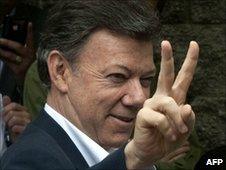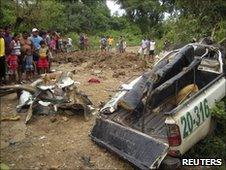Challenges ahead for Colombia's President-elect Santos
- Published

Mr Santos was confident of victory after casting his vote
In electing Juan Manuel Santos, Colombians have voted overwhelmingly for continuity.
The new president finds himself in a stronger position in many ways than the man he is replacing.
"Time is up for the Farc," were among the first words the triumphant Mr Santos uttered as he celebrated his victory. He was referring to the country's biggest rebel group, the Revolutionary Armed Forces of Colombia.
It was the promise to continue the Democratic Security Policy (DSP) of incumbent President Alvaro Uribe that swung it for many voters.
"We are going to consolidate the presence of the state in every centimetre of national territory," he added.
The DSP has faltered a bit in the last year, with homicides rising, particularly in the cities.
With his experience as defence minister for three years, Mr Santos has an intimate knowledge of the security challenges, and equally importantly, respect from the military top brass.
For Alfredo Rangel, the director of the Bogota think tank Security and Democracy Foundation, Mr Santos is the man to refine and adjust the DSP to meet the changing conditions of the 46-year civil conflict.
"A new emphasis is needed in urban and frontier security," said Mr Rangel.
"He will continue reducing drug trafficking and hitting the guerrillas. His election is a positive improvement for security in Colombia."
Mr Santos will be under no pressure to negotiate with the Farc.
The tool the guerrillas used to pressure President Uribe was the issue of a prisoner swap, holding almost 20 high-level hostages they want to exchange for associates held in prison.
However, earlier this month the daring special forces operation that liberated four of the hostages has given further credibility to the government's promise to rescue those hostages still in rebel hands.
Hostile neighbours
On the foreign policy front the key ally, the US, will be pleased to have business continue as normal with Mr Santos.
However, closer to home there are some serious problems.

Colombia's rebels still have the power to strike government forces
On the question of frontier security the new president will have to operate with one hand tied behind his back as both Ecuador and Venezuela do not have diplomatic relations with Colombia and are hostile to Mr Santos personally.
Ecuador severed diplomatic relations in March 2008 after Mr Santos, then defence minister, ordered the bombardment of a Farc camp 2km within Ecuadorian territory.
A court in Ecuador wants to charge Mr Santos in connection with the deaths of the 27 people killed in the bombardment.
President Hugo Chavez of Venezuela has been far more outspoken about Mr Santos, stating: "He is a threat to all of us," even suggesting that his election could "generate a war".
The Venezuela situation may well be one of the greatest challenges Mr Santos faces.
Both the rebels of the National Liberation Army (ELN) and the Farc are known to have a heavy presence across the border.
Mr Chavez froze diplomatic relations in July 2009 over the issue of the US military being given access to bases in Colombia.
Since then he has reduced bilateral trade and if Colombian intelligence sources are to be believed, allowed the rebels to consolidate their presence on his side of the frontier.
For analysts like Maria Victoria Llorente, director of the think tank Fundacion Ideas para la Paz, Colombia can no longer rely exclusively on the United States as the central strut of foreign policy.
Instead, the country needs to engage more in Latin America, particularly with Brazil, the regional superpower.
"The US is gradually disengaging from Colombia, and the fact that a free trade agreement between the two nations has still not been approved shows that Colombia needs to diversify its foreign partners," said Ms Llorente.
Security scandals
On the economic front Mr Santos will have some problems but inherits a strong platform for growth.
Unemployment is running at almost 12%, but with more than half of the country's workforce in the informal economy, the real number of people with little or no work is hard to gauge.
According to the Department of National Planning, 46% of Colombians live on or below the poverty line, with 17% living in abject poverty.
Foreign investment has been high under the Uribe administration, thanks particularly to the oil and mining industries which have lined up to prospect in areas previous dominated by guerrillas but now increasingly under state control.
Back in 2002 it was feared that Colombia might become a net oil importer, but the new wave of discoveries has pushed oil production up to 800,000 barrels per day, with that figure expected to rise to over a million barrels per day by the end of 2011.
Growth for 2010 is expected to reach almost 3%, and inflation is under tight control.
One of the problems this export economy has is the strong value of the peso, making the sale abroad of goods like coffee and flowers less competitive.
Some of the reasons for the rise of the Green Party candidate, Antanas Mockus, were the corruption and human rights abuses that have dogged the Uribe administration in recent years.
Evidence of illegal wiretaps by the secret police of the DAS and the scandal of the "false positives" - which have seen more than 1,000 cases of civilians murdered by soldiers then presented as rebels killed in combat - have all undermined the legitimacy of the government and the DSP.
Colombia is still one of the most dangerous countries in the world to be a trade unionist, with as many as 40 killed last year.
Mr Santos is going to have to address these problems. He will have to push ahead with the reform of the DAS and ensure the military respect human rights.
But the elections have handed Mr Santos a strong mandate.
He also has a stranglehold on Congress thanks to his Partido de la U and allies in the Conservative Party, Liberal Party and Cambio Radical.
However, the guerrillas showed on election day, when 10 members of the security forces were killed, that they still have a great capacity for destruction.
More than 400 tons of cocaine leave Colombian shores every year, earning the illegal armies billions of dollars. President-elect Santos has four tough years ahead of him.
- Published21 June 2010
- Published4 October 2012
- Published20 June 2010
- Published13 June 2010
- Published31 May 2010